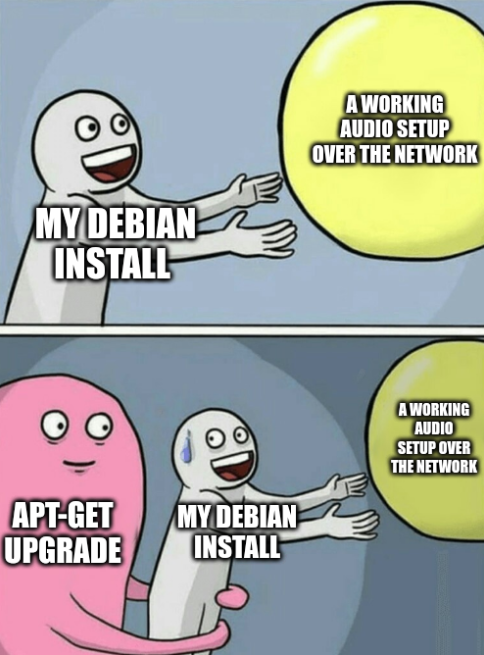this post was submitted on 15 May 2024
322 points (98.8% liked)
linuxmemes
21210 readers
95 users here now
Hint: :q!
Sister communities:
- LemmyMemes: Memes
- LemmyShitpost: Anything and everything goes.
- RISA: Star Trek memes and shitposts
Community rules (click to expand)
1. Follow the site-wide rules
- Instance-wide TOS: https://legal.lemmy.world/tos/
- Lemmy code of conduct: https://join-lemmy.org/docs/code_of_conduct.html
2. Be civil
- Understand the difference between a joke and an insult.
- Do not harrass or attack members of the community for any reason.
- Leave remarks of "peasantry" to the PCMR community. If you dislike an OS/service/application, attack the thing you dislike, not the individuals who use it. Some people may not have a choice.
- Bigotry will not be tolerated.
- These rules are somewhat loosened when the subject is a public figure. Still, do not attack their person or incite harrassment.
3. Post Linux-related content
- Including Unix and BSD.
- Non-Linux content is acceptable as long as it makes a reference to Linux. For example, the poorly made mockery of
sudoin Windows. - No porn. Even if you watch it on a Linux machine.
4. No recent reposts
- Everybody uses Arch btw, can't quit Vim, and wants to interject for a moment. You can stop now.
Please report posts and comments that break these rules!
founded 1 year ago
MODERATORS
you are viewing a single comment's thread
view the rest of the comments
view the rest of the comments

I've also used pulseaudio for this sort of things in the past, it's very flexible and works rather well!
When it works (!), it's one of the reasons I brag to my tech friends about Linux, and why I switched to Linux many many years ago. In fact, it was when Esound was a thing. But once in a while it stops working after an upgrade or a dist-upgrade, and I have to spend time trying to fix it.
I like to joke around with tech minded friends that Windows keeps breaking with every updates, but then I have to spend an hour finding out why my sinks disappeared after an upgrade, and I'm forced to realize that... sigh... these things happen with Linux too.
You could maybe look into using SnapCast, it would be independent from pulse and should work even through apt updates ;)
I haven't been using pluseaudio for an eternity, since the Linux machines I use are mostly headless,.yet I was a pluseaudio fanboy when it was.just replacing ALSA. Yet, the hours and hours pulseaudio cost me to fix some upmix that had stopped working or some other weird shit... IDK if I'd still preach it's upsides would I be in the same situation now.
I tend to like it. I use it even on some headless machines (for example for streaming audio). I'm gonna have to learn more about using Pipewire sadly.